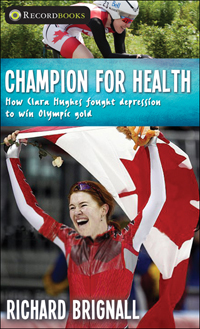| ________________
CM . . .
. Volume XXII Number 31. . . .April 15, 2016

 |
Champion for Health: How Clara Hughes Fought Depression to Win Olympic Gold. (Record Books).
Richard Brignall.
Toronto, ON: James Lorimer, 2016.
128 pp., pbk. & ebook, $12.95 (pbk.).
ISBN 978-1-4594-1080-0 (pbk.), ISBN 978-1-4594-1081-7 (ebook).
Subject Headings:
Hughes, Clara-Juvenile literature.
Hughes, Clara-Mental health-Juvenile literature.
Depressed persons-Canada-Biography-Juvenile literature.
Women cyclists-Canada–Biography-Juvenile literature.
Women speed skaters-Canada–Biography-Juvenile literature.
Women Olympic athletes-Canada–Biography-Juvenile literature.
Grades 5 and up / Ages 10 and up.
Review by Thomas F. Chambers.
** /4
|
| |
|

excerpt:
She decided to race in a small event in Collingwood, Ontario. It didn’t matter if she won or lost. It was just part of her training. Clara entered the race to get her body in shape, but found something more important. It happened on a small hill with about 10 kilometres left in the race. She decided to attack the course and started to sprint for the finish line. It was a hard pace. It could have cost her the race.
Instead, it reminded Clara to always push herself to her limits. She couldn’t hold back while in a race. She was hooked on the idea of on pushing herself to the max in every race.
Champion for Health is a biography of Clara Hughes, the outstanding Canadian athlete who won many medals (gold, silver and bronze) for speed skating and cycling at many international competitions. These included the Olympics and World Championships. The book has 19 chapters, with most being five pages in length. Each chapter has sidebars dealing with Hughes’ life or some aspect of athletics. The volume also lists Clara Hughes’ Career Highlights and has a Glossary and Index. In addition, there are 12 black and white photographs spread throughout the book. Champion for Health, which is intended for recreational reading, is easy to read and suitable for the intended age.
Hughes was an athlete with unusual talent, one of the best ever born in Canada. She specialized in two sports, speed skating and cycling, when most athletes are only proficient in just one. Her story could act as a motivator for other young adults questioning their abilities. Being a successful athlete requires determination and a devotion to the sport in question. It also requires a willingness to push oneself to the limit. Hughes had these qualities in abundance, but, in spite of this, she suffered from periods of severe depression which turned out to be a form of mental illness for which Hughes required professional help.
Early in her career, Hughes “felt useless, ugly and fat.” As a result, the National Cycling Team doctor “tried to help”... “figure out what was happening to her.” Not realizing she was becoming depressed, she refused his offer. As a result, she became so depressed she cried every day. At the end of her athletic career, however, Hughes became an advocate for people suffering from mental health problems. Because of her success as an athlete, she gained a more attentive audience than would be likely with a less well-known person. Because of her fame and history of depression, “she became the face of mental illness in Canada,” a champion of another kind.
Even as she aged and competing in both sports became more and more difficult, Hughes did not want to retire. She had become addicted to the adulation she received at the end of each competition. In this regard, she was little different from many successful athletes who love the applause and level of fame they receive. This fame, however, may not last long. Successful baseball and hockey players from a few years ago, for example, unless they were exceptional, are only minor footnotes, if they are mentioned at all, in the history of sport.
Richard Brignall is the author of seven other books published under Lorimer's “Recordbooks” series. A number were selected “as Resource Links' One of the Year’s Best and VOYA's Nonfiction Honor List.”
At times, Brignall's account of Hughes' career can be a bit confusing. For example, at the start of Chapter Seventeen, he wrote “at the Vancouver Olympics, she knew that she was through with speed skating.” Two pages later he wrote, “she knew she had to keep all her energy focused on skating in the 2010 Olympics.” The latter quotation should have come before the first because they both refer to the 2010 Olympics in Vancouver.
Recommended.
Thomas F. Chambers is a retired college teacher and author who lives in Northern Ontario.

To comment
on this title or this review, send mail to cm@umanitoba.ca.
Copyright © the Manitoba Library Association. Reproduction for personal
use is permitted only if this copyright notice is maintained. Any
other reproduction is prohibited without permission.
Next Review | Table of Contents For This Issue - April 15, 2016
CM Home | Back Issues
| Search
| CM Archive
| Profiles Archive
|
